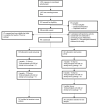Effects of a Mobile and Web App (Thought Spot) on Mental Health Help-Seeking Among College and University Students: Randomized Controlled Trial
- PMID: 33124984
- PMCID: PMC7665949
- DOI: 10.2196/20790
Effects of a Mobile and Web App (Thought Spot) on Mental Health Help-Seeking Among College and University Students: Randomized Controlled Trial
Abstract
Background: Mental health disorders are the most prevalent health issues among postsecondary students, yet few solutions to this emerging crisis exist. While mobile health technologies are touted as promising solutions for the unmet mental health needs of these students, the efficacy of these tools remains unclear. In response to these gaps, this study evaluates Thought Spot, a mobile and web app created through participatory design research.
Objective: The goal of the research is to examine the impact of Thought Spot on mental health and wellness help-seeking intentions, behaviors, attitudes, self-stigma, and self-efficacy among postsecondary students in Canada.
Methods: A 2-armed randomized controlled trial involving students from three postsecondary institutions was conducted. Students were eligible if they were aged 17 to 29 years, enrolled in full-time or part-time studies, functionally competent in English, and had access to a compatible digital device. The usual care group received a mental health services information pamphlet. The intervention group received the Thought Spot app on their digital device. Thought Spot is a standalone app that allows users to add, review, and search crowdsourced information about nearby mental health and wellness services. Users can also track their mood on the app. Outcomes were self-assessed through questionnaires collected at baseline and 3 and 6 months. The primary outcome was change in formal help-seeking intentions from baseline to 6 months, measured by the General Help-Seeking Questionnaire. A mixed-effects model was used to compare the impact of usual care and intervention on the primary outcome (formal help-seeking intentions). Secondary outcomes included changes in informal help-seeking intentions and help-seeking behaviors, help-seeking attitudes, self-stigma, and self-efficacy.
Results: A total of 481 students were randomized into two groups: 240 to usual care, and 241 to the intervention group. There were no significant differences in help-seeking intentions between the usual care and intervention groups over 6 months (F2,877=0.85; P=.43, f=0.04). Both groups demonstrated similar increases in formal help-seeking intentions at 3 and 6 months (F2,877=23.52; P<.001, f=0.21). Compared with males, females sought more help from formal resources (OR 1.86; 95% CI 1.22 to 2.83, P=.001). Females were less likely to seek help from informal sources than males (OR 0.80; 95% CI 0.22 to 0.73, P<.001).
Conclusions: Prompting postsecondary students about mental health and help-seeking appears to increase help-seeking intentions. mHealth interventions may be as effective as information pamphlets in increasing formal help-seeking but may confer a small advantage in driving help-seeking from informal sources. Although there is enthusiasm, developers and health policy experts should exercise caution and thoroughly evaluate these types of digital tools. Future studies should explore the cost-effectiveness of digital interventions and develop strategies for improving their efficacy.
Trial registration: ClinicalTrials.gov NCT03412461; https://clinicaltrials.gov/ct2/show/NCT03412461.
International registered report identifier (irrid): RR2-10.2196/resprot.6446.
Keywords: crowdsourcing; help-seeking behavior; mental health; mobile applications; randomized controlled trial; school mental health services; social support; young adult.
©David Wiljer, Jenny Shi, Brian Lo, Marcos Sanches, Elisa Hollenberg, Andrew Johnson, Alexxa Abi-Jaoudé, Gloria Chaim, Kristin Cleverley, Joanna Henderson, Wanrudee Isaranuwatchai, Andrea Levinson, Janine Robb, Howard W Wong, Aristotle Voineskos. Originally published in the Journal of Medical Internet Research (http://www.jmir.org), 30.10.2020.
Conflict of interest statement
Conflicts of Interest: None of the authors have conflicts of interest to disclose.
Figures


References
-
- Auerbach RP, Mortier P, Bruffaerts R, Alonso J, Benjet C, Cuijpers P, Demyttenaere K, Ebert DD, Green JG, Hasking P, Murray E, Nock MK, Pinder-Amaker S, Sampson NA, Stein DJ, Vilagut G, Zaslavsky AM, Kessler RC, WHO WMH-ICS Collaborators WHO World Mental Health Surveys International College Student Project: prevalence and distribution of mental disorders. J Abnorm Psychol. 2018 Oct;127(7):623–638. doi: 10.1037/abn0000362. - DOI - PMC - PubMed
-
- Cunningham S, Duffy A. Investing in our future: importance of postsecondary student mental health research. Can J Psychiatry. 2019 Feb;64(2):79–81. doi: 10.1177/0706743718819491. http://europepmc.org/abstract/MED/30819000 - DOI - PMC - PubMed
-
- The human face of mental health and mental illness in Canada. Ottawa: Government of Canada; 2006. [2020-09-28]. https://www.phac-aspc.gc.ca/publicat/human-humain06/pdf/human_face_e.pdf.
Publication types
MeSH terms
Associated data
Grants and funding
LinkOut - more resources
Full Text Sources
Medical
Miscellaneous

